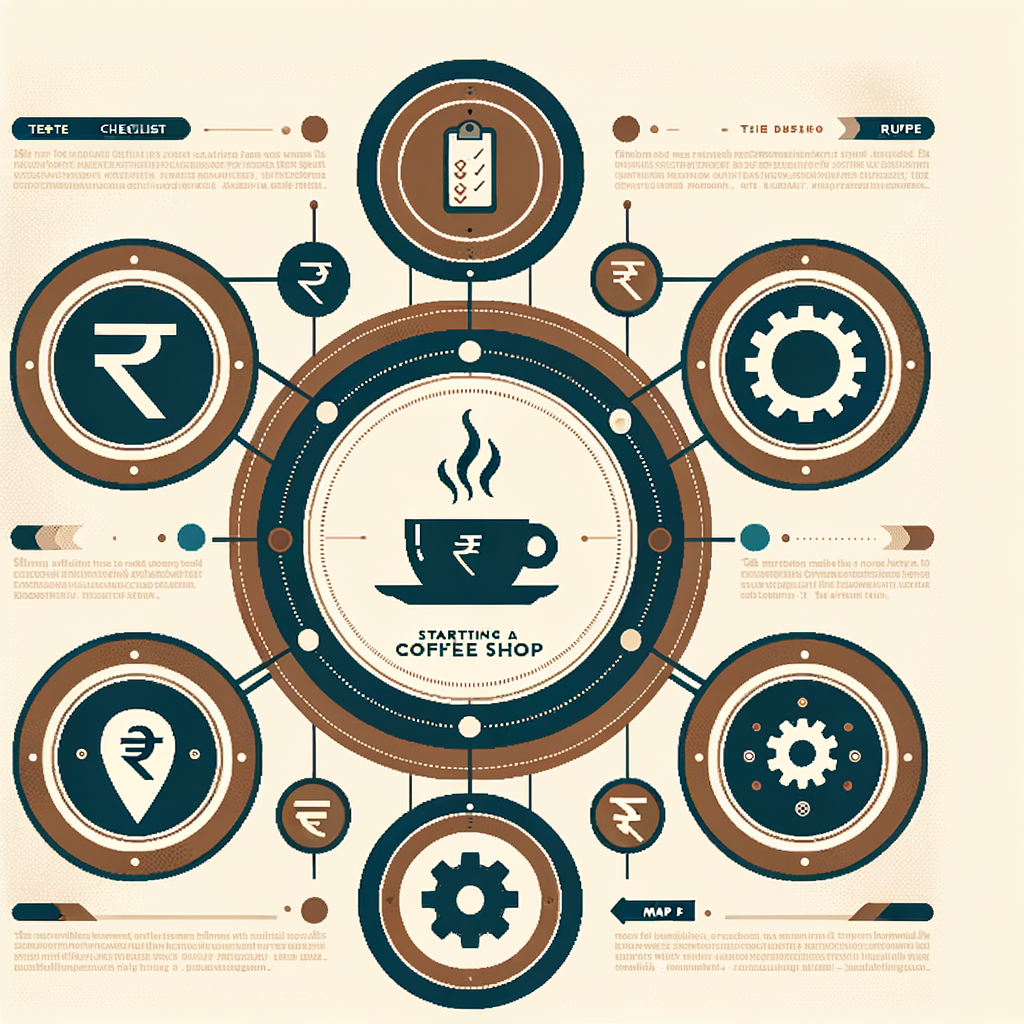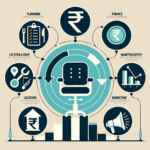How to Start a Coffee Shop or Café in India: A Complete Guide
The aroma of freshly brewed coffee, the gentle hum of conversation, and the cozy ambiance of a local café—it’s a dream many of us share. India’s café culture is booming, transforming from a simple beverage stop into a hub for work, socializing, and relaxation. If you’ve ever dreamt of owning one, now is a fantastic time to start a coffee shop. This blog post is your comprehensive, step-by-step guide on how to start a coffee shop in India, covering everything from the initial idea to legal registrations and daily operations. Whether you’re a budding entrepreneur or a salaried professional looking for a new venture, this guide simplifies the process of starting a café in India for beginners.
Step 1: Crafting a Winning Coffee Shop Business Plan
Before you even think about buying an espresso machine, you need a rock-solid business plan. This document is your blueprint for success, guiding your decisions and helping you secure funding. It’s the most critical first step when you decide to start a café business in India. A well-thought-out plan forces you to think through every aspect of your business, identifying potential challenges and opportunities before you invest a single rupee. It clarifies your vision and sets measurable goals, making it an indispensable tool for turning your passion into a profitable enterprise.
Define Your Café’s Concept and USP
Your café needs a unique identity to stand out in a competitive market. What will your story be? Start by deciding on a concept. Will it be a Quick Service Restaurant (QSR) focused on speed and convenience for office-goers, a theme-based café (like vintage, books, or pets), a specialty coffee bar for connoisseurs, a co-working café with high-speed internet and power outlets, or a quiet bookstore café?
Once you have a concept, define your Unique Selling Proposition (USP). What makes your café special? Your USP could be anything from sourcing single-origin, artisanal coffee beans from a specific estate to offering unique food pairings like gourmet sandwiches or vegan desserts. Perhaps you’ll focus on building a community through open mic nights and workshops, or maybe your USP is an unbeatable ambiance with exceptional interior design. This core identity will influence your branding, menu, and marketing.
Identify Your Target Audience and Location
Who are you serving? Your target audience will dictate almost every decision, especially your location. Are you targeting college students who need an affordable place to hang out, corporate professionals looking for a quick lunch or a meeting spot, or families seeking a weekend treat? Understanding your customer’s needs, lifestyle, and spending habits is crucial.
The right location is everything. A spot with high footfall, like a busy market or near a metro station, is great for a QSR model. A quieter, more accessible neighborhood spot might be perfect for a community-focused café. Before finalizing, analyze the area’s rent, accessibility, parking availability, and proximity to your target demographic. Also, scout the competition. Being near other cafés isn’t always bad—it can create a “food hub”—but you must ensure your USP is strong enough to draw customers in.
Develop Your Menu and Pricing Strategy
Your menu is the heart of your café. While coffee is the star, a well-rounded menu with snacks, light meals, and desserts is essential for increasing your average order value. Start by sourcing high-quality coffee beans—this is non-negotiable. Find a reliable roaster who can provide consistent quality. From there, build out your beverage menu: espresso-based drinks, manual brews, teas, and cold beverages. For food, consider items that complement your coffee and are relatively easy to prepare, such as sandwiches, pastries, cakes, and cookies.
Pricing requires a careful balance. You need to be profitable but also competitive. Start by calculating the “food cost” for each item on your menu (the cost of all ingredients used). A general rule of thumb is to keep food costs between 25-35% of the selling price. Remember to factor in all your overheads—rent, salaries, utilities, marketing—and your desired profit margin. Research what your competitors are charging to ensure your prices are aligned with the market.
Step 2: Structuring Your Business & Financial Planning
With your business plan in hand, it’s time to handle the foundational legal and financial aspects. Making the right choices at this stage is vital for smooth operations, legal compliance, and future growth. This is a key part of our guide to starting a café in Indian market, as the right structure can protect your personal assets and save you from future legal headaches. It’s the formal step that turns your idea into a legitimate business entity.
Choose the Right Business Structure
Choosing the Right Legal Structure for Your Business is a critical decision that impacts your liability, taxation, and ability to raise funds. India offers several options, each with its own set of pros and cons.
| Business Structure | Best For | Key Features |
|---|---|---|
| Sole Proprietorship | Single owner, small-scale, minimal budget | Easy to set up, low compliance, unlimited personal liability. |
| Partnership Firm | Two or more owners co-managing the business | Requires a Partnership Deed, profits are shared, partners have unlimited liability. |
| LLP | Partners seeking liability protection | Partners’ liability is limited to their investment, offers operational flexibility. |
| Private Limited Co. | Entrepreneurs planning to scale or seek funding | Separate legal entity, protects personal assets, higher compliance. |
For most serious café ventures, an LLP or a Private Limited Company is recommended. An LLP offers a great balance, while a Private Limited Company is the gold standard if you plan to seek funding from angel investors or venture capitalists in the future.
Unsure which structure is right for you? TaxRobo’s experts can help you choose and register your business entity.
Estimate Your Startup Costs and Secure Funding
Starting a coffee shop requires significant capital investment. It’s crucial to create a detailed budget to understand exactly how much money you’ll need. Your one-time startup costs will typically include:
- Rent Deposit: Usually equivalent to 3-6 months of rent.
- Interior Design and Renovation: Costs for civil work, plumbing, electricals, and creating the perfect ambiance.
- Kitchen Equipment: This is a major expense. It includes the espresso machine, coffee grinders, blenders, ovens, refrigerators, and display cases.
- Furniture and Fixtures: Tables, chairs, lighting, and counters.
- Initial Inventory: Your first big stock of coffee beans, milk, sugar, syrups, and food ingredients.
- Licensing and Registration Fees: Costs for all the mandatory permits.
- POS (Point of Sale) System: Software and hardware for billing and inventory management.
- Marketing and Branding Expenses: Logo design, menu printing, and initial promotional activities.
To cover these costs, you can use your personal savings, apply for a business loan from a bank (the MUDRA loan scheme is a popular option for small businesses), or, if you have a Private Limited Company, raise funds from friends, family, or external investors. For more detail, follow our A Guide to Budgeting and Financial Planning for Startups.
Step 3: The Ultimate Checklist for Licenses and Registrations
Navigating the web of legal paperwork is one of the most daunting tasks when opening a coffee shop in India. A single missing license can lead to hefty fines or even closure. To operate legally and build trust with your customers, you must secure all the required permits. Here’s a checklist of the most important licenses you’ll need.
The licensing process can be complex. TaxRobo simplifies it by managing all your legal registrations from start to finish.
FSSAI License
The Food Safety and Standard Authority of India (FSSAI) license is the most critical permit for any food business. It certifies that your café adheres to the food safety and hygiene standards prescribed by the government. The type of license depends on your annual turnover:
- Basic Registration: For turnover up to ₹12 lakh.
- State License: For turnover between ₹12 lakh and ₹20 crore.
- Central License: For turnover above ₹20 crore or for operating in multiple states.
You can apply for this license through the official FSSAI FoSCoS portal.
GST Registration
Goods and Services Tax (GST) registration is mandatory if your café’s annual turnover is expected to exceed ₹20 lakh (for services). This threshold is ₹10 lakh for some special category states. For a café bill, you will charge your customers GST, which is currently 5% for restaurant services (comprising 2.5% CGST + 2.5% SGST). It’s important to note that under this 5% slab, you cannot claim Input Tax Credit (ITC) on your expenses, such as rent, raw materials, or capital goods. You must register on the official GST Portal. For a complete walkthrough, refer to our Ultimate Guide to GST Registration for Small Businesses.
Shop and Establishment Act License
This is a state-specific license that every commercial establishment, including a café, must obtain from the local municipal corporation. It regulates the working conditions of your employees, including working hours, weekly holidays, and other rights. The process and fees vary from state to state.
Other Key Permits
In addition to the main licenses, you will likely need a few other permits depending on your location and scale of operations:
- Health/Trade License: Issued by the local municipal health department or corporation, this license ensures your café is not a health hazard to the public.
- Fire Safety Certificate: If your café has a significant seating capacity (the limit varies by state), you will need a No-Objection Certificate (NOC) from the local fire department to confirm you have adequate fire safety measures in place.
- Music License: If you plan to play recorded music or host live performances, you must obtain a license from Phonographic Performance Limited (PPL) or the Indian Performing Right Society (IPRS).
- Certificate of Environmental Clearance (CEC): In some cases, you may need clearance from the State Pollution Control Board to ensure your operations are environmentally sound.
Step 4: Setting Up Operations and Hiring Your Team
With the business plan and legal paperwork sorted, it’s time to bring your vision to life. This phase involves setting up your physical space, building relationships with suppliers, and hiring a great team. Here are some practical tips for coffee shop business India that can make or break your daily operations.
Sourcing Suppliers and Equipment
Your café is only as good as its ingredients. Finding reliable suppliers is paramount. For coffee, connect with local roasters. Ask for samples, understand their roasting profiles, and build a strong relationship. For milk, fresh produce, and baked goods, find local vendors who can guarantee quality and consistent, on-time delivery.
For equipment, you have the choice of buying new or used. A new, high-quality espresso machine is a worthy investment as it’s the workhorse of your café. However, you might save money by purchasing used ovens, refrigerators, or furniture. Always prioritize quality and reliability over the lowest price, as equipment breakdowns can bring your business to a halt.
Hiring and Training Staff
Your staff is the face of your café. They interact with every customer and are crucial to creating a welcoming atmosphere. Look for people with the right skills and, more importantly, the right attitude. Key roles include:
- Baristas: They should be passionate about coffee, skilled in brewing techniques, and have excellent customer service skills.
- Chef/Cook: If your menu includes more than just pastries, you’ll need someone to manage the kitchen.
- Service Staff: Friendly and efficient staff to take orders, serve food, and keep the café clean.
Once hired, invest in thorough training. Train them not just on the menu and equipment but also on your brand’s story, customer service standards, and strict hygiene protocols. A well-trained, happy team leads to happy customers.
Implementing a POS System
In today’s digital age, a Point of Sale (POS) system is non-negotiable. It does much more than just process payments. A modern POS system helps you track sales in real-time, manage your inventory by showing which items are selling best, and generate reports that provide valuable insights into your business performance. This data can help you make informed decisions about your menu, pricing, and staffing.
Step 5: Marketing Your Coffee Shop
You’ve built a beautiful café, but now you need to get people through the door. A smart marketing strategy is essential to build awareness and drive footfall, both before and after you open.
Pre-Launch Buzz
Start your marketing efforts well before your grand opening. Create social media profiles for your café on platforms like Instagram and Facebook. Post “Coming Soon!” teasers, share behind-the-scenes glimpses of the renovation, and introduce your concept and USP. You can run a small, targeted digital ad campaign in your local area to build anticipation. Consider a “soft launch” a few days before the official opening, inviting friends, family, and local influencers to get feedback and generate early reviews.
Grand Opening and Post-Launch Marketing
Make your grand opening an event to remember. Offer special discounts or a freebie with every order. Once you are up and running, your marketing efforts need to be consistent.
- Local SEO: This is crucial. List your café on Google Maps (through a Google Business Profile). Ensure your address, phone number, and opening hours are accurate. Encourage happy customers to leave positive reviews and upload high-quality photos of your food, coffee, and ambiance.
- Social Media Marketing: Instagram is your best friend. Post visually appealing pictures and videos daily. Run contests, engage with comments and messages, and use relevant local hashtags.
- Loyalty Programs: Encourage repeat business by offering loyalty cards (e.g., “Buy 5 coffees, get the 6th free”) or a digital rewards program.
- Collaborations: Partner with other local businesses, host events with local artists or musicians, and collaborate with food bloggers or influencers to reach a wider audience.
Conclusion
The journey to start a coffee shop is filled with challenges, from writing a detailed plan and navigating legal hurdles to managing daily operations. However, with the right preparation, passion, and a customer-centric approach, it is an incredibly rewarding venture. By focusing on a solid business plan, securing the correct legal structure, obtaining all mandatory licenses, and executing a smart marketing strategy, you can build a thriving café that becomes a beloved part of your community. Remember these tips for coffee shop business India to stay on the right track.
Ready to turn your café dream into reality? From company registration to GST filing, TaxRobo is your trusted partner for all financial and legal needs. Contact us today for a free consultation!
FAQ Section
1. What is the approximate cost to start a small café in India?
The cost can vary significantly based on the city, location, size, and level of interior design. For a small-to-medium-sized café (around 500-800 sq. ft.), the initial investment can range from ₹8 lakhs to ₹15 lakhs. This includes rent deposit, interiors, equipment, licensing, and initial inventory. A smaller kiosk or takeaway-only model could cost significantly less.
2. Which licenses are absolutely mandatory before opening a café?
The most critical, non-negotiable licenses are the FSSAI License (for food safety), GST Registration (if your turnover exceeds the threshold), and the state-specific Shop and Establishment License. Other permits like a Health/Trade License and a Fire Safety Certificate are also crucial for legal and safe operation.
3. How does GST apply to a coffee shop bill?
Currently, restaurants, cafés, and other food service providers charge 5% GST on the total bill amount. An important point to remember is that businesses operating under this 5% GST composition scheme are not eligible to claim Input Tax Credit (ITC) on their inward supplies, such as rent, raw materials, and other operational expenses.
4. Is starting a café business in India profitable?
Yes, it can be a highly profitable business. Success hinges on factors like a prime location, a unique and appealing concept, strong operational efficiency, cost control, and delivering exceptional customer service. Profit margins on beverages, especially coffee, are typically quite high, which can significantly boost overall profitability. Focusing on increasing beverage sales is one of the best tips for coffee shop business India.



